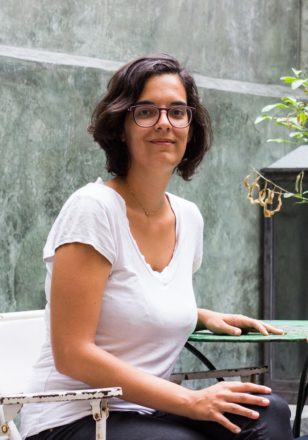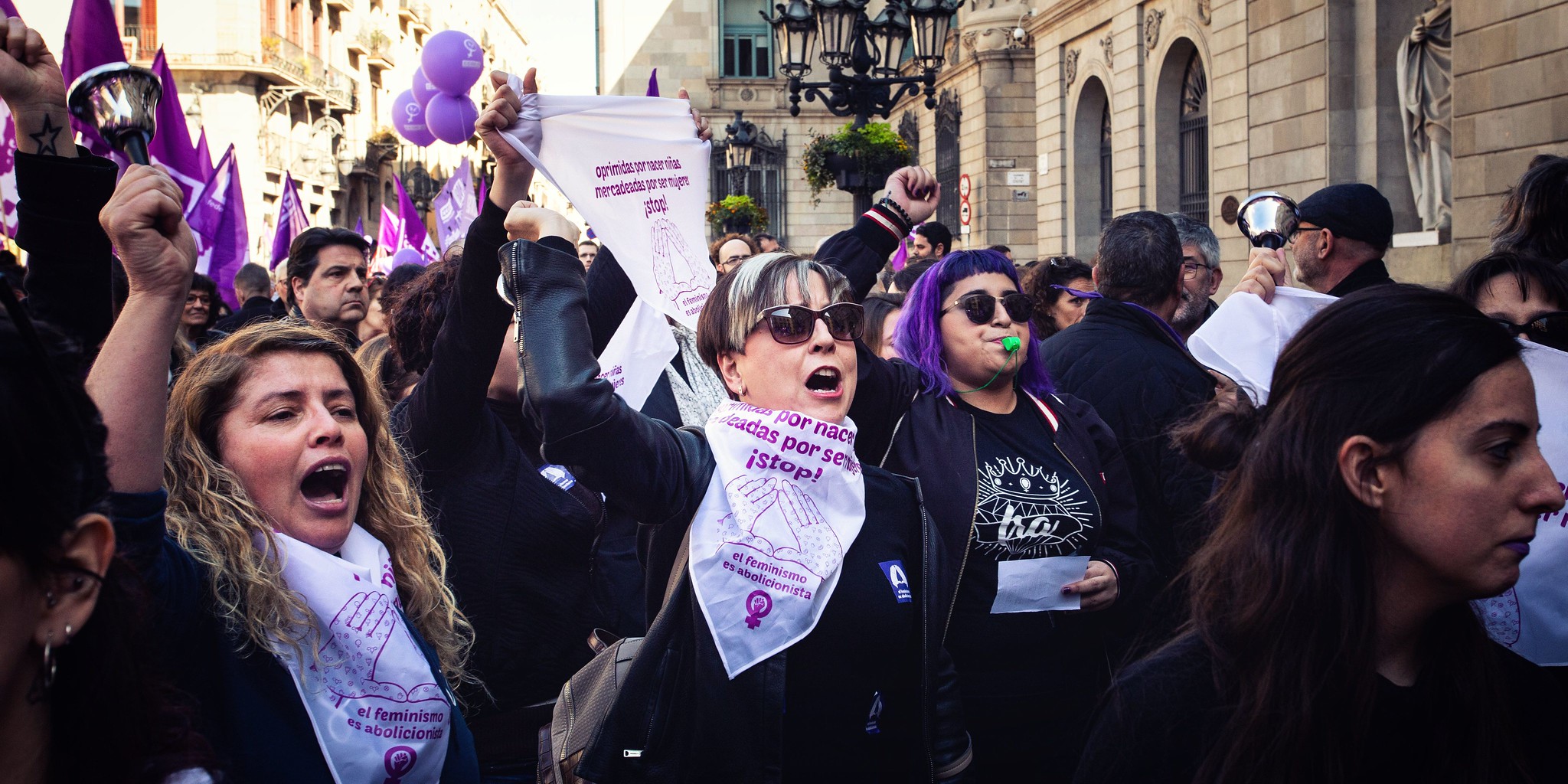Spain is being hit with a “tsnuami of feminism” with its government having far more female state ministers than anywhere else in Europe. Despite this, the road to equality moves slowly with mothers being especially disadvantaged.
By Christine Memminger, Barcelona
Purple t-shirts and posters fill the streets of Spanish cities across the country on International Women’s Day. The 8th of March is not quite a holiday, but since a few years it has embodied a feminist movement which is unique in its size throughout Europe. More than five million women joined the feminist strike (“Huelga feminista”) this year and stopped going to work, according to union figures. Among them were famous personalities such as actress Penélope Cruz and Queen Letizia of Spain.

32-year-old Marta Busquets Gallego was also in Barcelona for the major demonstration fighting for more equality. She smiles triumphantly: “Nothing can stop us.” As she talks about it, she is with her family enjoying the summer holidays at her grandparents; her two children are playing outside. Busquets sits relaxed in the children’s room wearing a wide t-shirt and her black curls slightly tucked back. Her main concern in the fight for more equality is to improve the situation for Spanish mothers.
Five years ago, Busquets herself had to give up her position as a lawyer after the birth of her daughter Astrid. She was faced with the choice of either raising a child or her career—having both is difficult to reconcile in Spain. There are many childcare options, it is the labor market that is inflexible with little support from the state. With a high unemployment rate of 14 percent, the situation is intense for everyone. If you want to spend more time with your children, you risk your job. Even more so if you are a woman, because women are more likely to work in precarious conditions with fixed-term contracts and earning less. “This system punishes mothers,” says Busquets. “This is extremely alarming.”
The issue of equal rights is trending in Spain. The newspaper “El País” describes the movement as a “tsunami of feminism” that has been raging over Spain for about two years. This “tsunami” is intensively covered by the media. Female journalists also went on strike on March 8 for better working conditions and are covering various angles of the movement such as reporting on female victims of violence at the hands of those in prominent positions, the right to self-determination, and are increasingly writing about women in leadership positions.
This is not to say that inequalities in Spain are greater than in Germany, for example. According to the European Institute for Gender Equality Index 2017, Spain falls in the middle in comparison to other European countries. In Spain, the focus is just different. One could say that machismo is on the verge of collapse. Politicians are also now putting the issue at the top of the agenda. During the election campaign, there was a passionate debate about the protection of female victims of violence, equal pay, and even the tax on tampons. Even Prime Minister Pedro Sánchez publicly calls himself a feminist. In his socialist government, 11 out of 18 positions are filled by women. As of 2018, this is the first time that a Spanish government has had more female ministers than male ministers, making it the most in Europe.
“Politicians are forced to discuss feminist issues,” says scientist Gema García Albacete in an interview before the last elections in April. She examines the political behavior of different social groups and identifies two main causes for this “enormous feminist mobilization”: first, a few years ago, the conservative People’s Party wanted to tighten the abortion law and return to the more rigid law of the 1980s. It failed due to massive public protests.
Secondly, since 2017, there has been increased attention for “violencia machista”—violence by men against women. In Spain, at the same time as the #MeToo debate, the case of a brutal rape of an 18-year-old girl in Pamplona was being debated in courts and a mild verdict was initially reached. “The intensity of the reactions was a surprise for Spanish society and above all, for Spanish politics,” says García Albacete. Since then, feminists have regularly mobilized in the tens of thousands at their rallies, and it’s all about the big picture.
Spanish mothers are being discriminated against
Discrimination is particularly clear in the case of mothers. Marta Busquets formulates it in drastic terms: “For me, having children meant hard cuts in income, hard cuts in career opportunities, more precarious conditions. That’s why many people tell me they can’t afford to have children.” The 32-year-old is from Barcelona, her parents are part of the middle class. Growing up, she studied and worked abroad. As a lawyer, climbing the career ladder was a steep and uphill. Shortly before she became pregnant, she was earning twice as much as her husband as an economist.

She describes what she observed with her older colleagues as a “typically Spanish phenomenon”. In order not to lose their jobs on a competitive labor market, they pushed the question of having a child further and further back. “Everyone around me became a mother only around 40, 35 was already early. Hormone treatments, artificial insemination and egg donation are legal in Spain, and even health insurance companies cover the costs in most cases. “But for me it was clear: I don’t want that,” says Busquets.
After her daughter Astrid was born five years ago, the maximum of 16 weeks of paid maternity leave followed—of which six weeks are compulsory—and then unemployment. Busquets did not want to put her child in childcare before her second birthday and would have therefore needed shorter and more flexible working hours. Under these circumstances, her contract was not renewed.
Parents in Spain have a right to part-time work, but it is hardly implemented in reality. Functional models of part-time work are not common, and if they do exist, they are found only in low-paid occupations. Those who take a career break in order to raise their children have to face the reality of losing their jobs. The European Commission has recently requested that the country spend more money on families because every third Spanish child is at risk of poverty.
Marta Busquets has since become self-employed as a lawyer and author, and produces a podcast. Two years ago, she had a son and now works on weekends, at night, or when her husband takes care of the children. Most Spanish women don’t have this opportunity or the courage. Since fathers are currently only entitled to eight weeks of parental leave, their grandparents or— in 38 percent of cases—day-care centers take care of children from the age of six months at the latest. “I have friends who leave their children in private daycare centers from seven in the morning to seven in the evening,” says Busquets. She does not regret her own decision, but she is demanding freedom of choice and in any case, better financial support for mothers.
High proportion of women in Spanish parliament
Busquets is not alone with her demands; the feminist movement is making its way to the government. At the moment, Spain has a transitional government because the coalition negotiations between the socialists (PSOE) and the left (Podemos) have failed and a new election have been recently held on November 10th. This is why the PSOE female ministers and leaders are currently not available for interviews. There is no time outside of the current events, they say. They could already praise themselves for the many feminist initiatives they have done, such as parental leave for fathers being increased to 16 weeks by 2021. These 16 weeks however are not easily transferred to the mother in the case the father does not use all 16 weeks—something Marta Busquets criticizes. But one thing after another. The PSOE also recently introduced a law to combat the gender pay gap.

For the first time, Spain’s Vice President is also the head of the Ministry of Equality. Generally speaking, Spanish politics is becoming more and more feminine. Since 2007, the electoral law has stipulated that at least 40 percent of party seats must be filled by women. This leads to a high proportion of female politicians at all levels of parliament. The socialists under Pedro Sánchez even exceed the quota in the last election with their party seats being perfectly zipped, alternating between men and women.
Now only the top candidates are missing. At the regional and municipal levels, women are increasingly leading their parties in election campaigns, but so far only men have competed for the office of prime minister. Political scientist Gema García Albacete describes the political leadership style as “still very masculine, very aggressive” and points out that the counter-movement—with a clearly male electorate—is also strengthening at the moment. For the first time, the right-wing populist party “Vox” has a seat in the Spanish parliament. “Their strongly anti-feminist orientation is aimed directly at women’s rights and equality,” says the political scientist.
Marta Busquets finds this disturbing. For her daughter Astrid, she imagines a future with equal pay and a better balance between family and career. The chances are good. Young people in particular have become much more feminist in recent years. According to the current “Barometer for Youth and Gender” (Barómetro Juventud y Género), 62 percent of Spanish women under the age of 30 now describe themselves as feminists and 66 percent perceive the inequality between the sexes as “very high”. Half of the young men also agree with this statement and 37 percent of them describe themselves as feminists. Feminism is trending in Spain.











